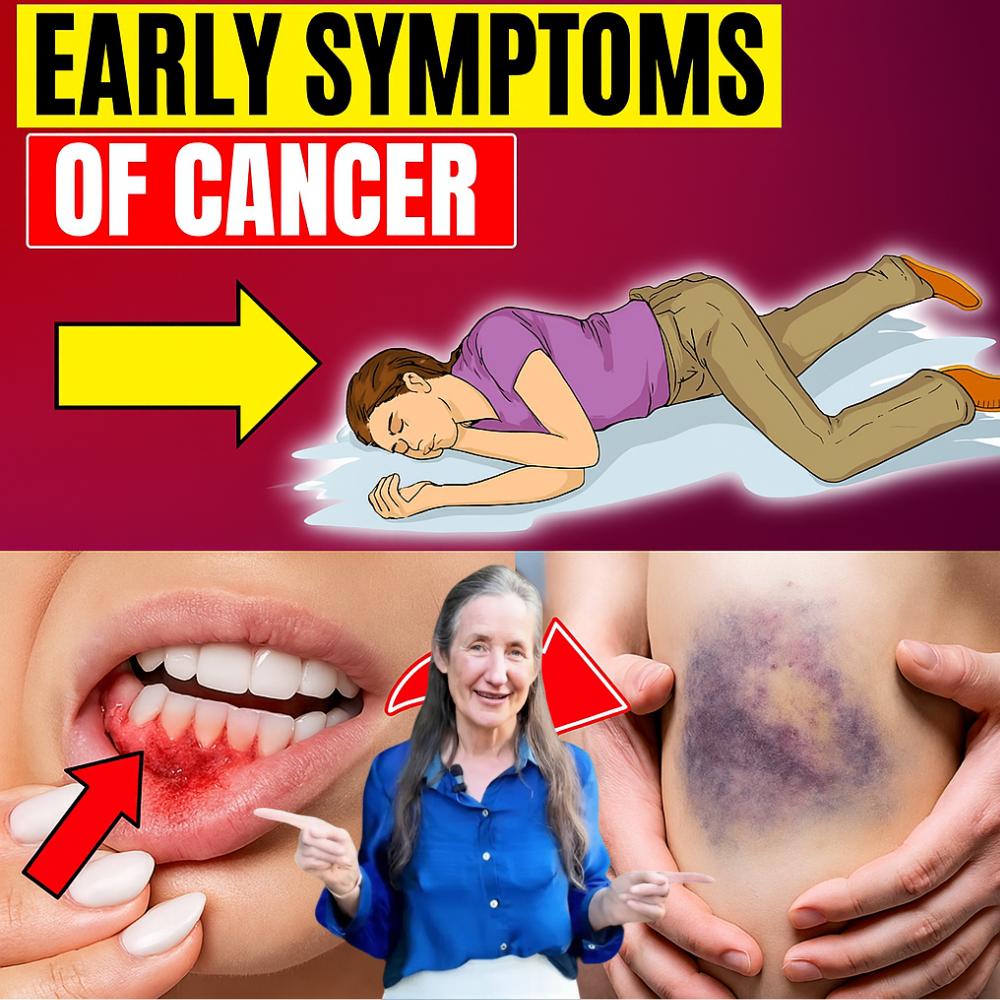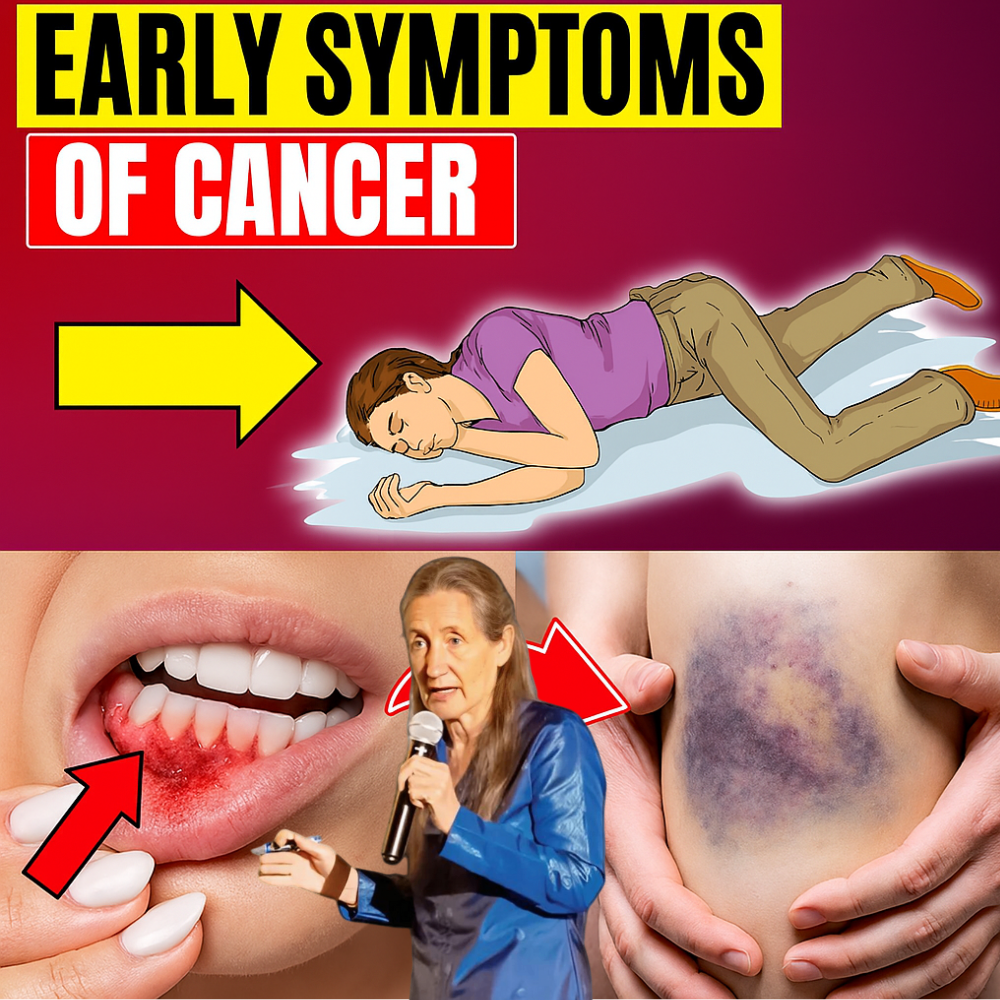Cancer. The word alone sends shivers down the spine. It’s a silent threat that can strike anyone, anywhere, at any time. But here’s the truth: catching it early can mean the difference between life and death. The earlier you spot the signs, the better your chances of beating it. This isn’t just another health article—it’s a wake-up call. Your body is trying to tell you something, and ignoring it could be deadly. Are you ready to listen?
In this gripping guide, we reveal 12 early cancer warning signs that could save your life. These aren’t vague symptoms you can brush off. They’re red flags screaming for your attention. From mysterious weight loss to persistent pain, we’ll dive deep into what your body might be signaling and why you need to act fast. Designed to keep you hooked, this article will arm you with the knowledge to protect yourself and your loved ones. Don’t wait until it’s too late—read on to uncover the signs you can’t afford to ignore.

🌟 Why Early Detection Is Your Superpower
Every year, millions are diagnosed with cancer. The scariest part? Many don’t realize something’s wrong until it’s advanced. But here’s the good news: early detection dramatically boosts survival rates. According to medical experts, catching cancer in its initial stages can increase treatment success by up to 90% for some types. Your body often sends subtle clues long before a diagnosis. The key is knowing what to look for and acting without delay.
This article isn’t about scaring you—it’s about empowering you. By understanding these 12 warning signs, you’ll be equipped to take control of your health. Whether it’s a nagging cough or a strange lump, no symptom is too small to investigate. Let’s dive into the signs that could be your body’s cry for help.
⚖️ 1. Unexplained Weight Loss: A Silent Alarm
Picture this: you’re dropping pounds without trying. Sounds like a dream, right? Wrong. Unexplained weight loss—losing 10 pounds or more without changes in diet or exercise—can be a glaring warning sign of cancer. Cancers like pancreatic, stomach, esophageal, or lung cancer often trigger this symptom. Your body might be burning energy at an abnormal rate as cancer cells grow.
If the scale is tipping and you don’t know why, don’t celebrate just yet. Accompanying symptoms like fatigue or weakness could point to something serious. Schedule a doctor’s visit to rule out underlying issues. Your health is worth the check-up.
😴 2. Relentless Fatigue: When Rest Isn’t Enough
We all get tired, but cancer-related fatigue is different. It’s a bone-deep exhaustion that lingers no matter how much you sleep. Cancers like leukemia or lymphoma can sap your energy by disrupting your blood or immune system. If you’re constantly drained, struggling to get through the day, or feeling weaker than usual, your body might be signaling trouble.
Don’t dismiss it as “just stress” or “overwork.” Persistent fatigue deserves a closer look. A simple blood test or consultation could uncover the root cause. Listen to your body—it’s trying to protect you.

🩹 3. Pain That Won’t Quit: A Persistent Warning
Pain is your body’s way of saying something’s wrong. But when it lingers for weeks or months without explanation, it could be a cancer clue. A stubborn headache might hint at brain cancer, while ongoing back pain could signal spinal or ovarian cancer. The key is persistence—if over-the-counter meds don’t help, it’s time to dig deeper.
Don’t ignore aches that feel “off” or refuse to go away. Track the pain’s location, intensity, and duration, then share it with your doctor. Early investigation could catch something before it spreads.
🩺 4. Skin Changes: Your Body’s Visible Red Flags
Your skin is a window to your health. A new mole, a changing mole, or one that bleeds could scream skin cancer, especially melanoma. Look for asymmetry, irregular borders, or color changes in moles. Beyond moles, yellowish skin or eyes (jaundice) might point to liver or pancreatic cancer. Even unexplained bruising or rashes can be warning signs.
Check your skin regularly, and don’t ignore anything unusual. A dermatologist or doctor can evaluate changes quickly. Catching skin cancer early often means simpler, more effective treatment.
🍽️ 5. Trouble Swallowing: A Throat’s Cry for Help
Struggling to swallow or feeling like food is stuck in your throat isn’t just annoying—it could be serious. Esophageal or throat cancer often starts with this symptom. If it happens occasionally, it might be nothing. But if it’s frequent or worsening, don’t wait.
This is one sign that’s easy to brush off as acid reflux or stress. Don’t fall into that trap. A doctor can perform tests like an endoscopy to get answers. Acting fast could save your life.
🚬 6. Persistent Cough or Hoarseness: Don’t Ignore Your Lungs
A cough that won’t quit—especially if you’re not sick—could be a lung cancer warning. Hoarseness or a voice change lasting weeks might point to throat or lung issues. Smokers and non-smokers alike should take this seriously. Blood in your sputum or shortness of breath makes it even more urgent.
Don’t assume it’s just allergies or a cold. If a cough or voice change lingers beyond two weeks, see a doctor. A chest X-ray or CT scan could catch something early, when it’s most treatable.
🚻 7. Bowel Changes: Your Gut’s Urgent Message
Your bathroom habits can reveal a lot. Sudden, unexplained changes like diarrhea, constipation, or blood in your stool could signal colorectal cancer. A feeling of incomplete bowel movements or pencil-thin stools are also red flags. These symptoms might seem embarrassing, but they’re critical to address.
Monitor your bowel habits for a few weeks. If changes persist, don’t hesitate to talk to your doctor. A colonoscopy can detect issues early, often before they become life-threatening.
🩺 8. Unexplained Bleeding: A Major Red Alert
Any unexplained bleeding demands attention. Blood in your stool, urine, or sputum could indicate colorectal, kidney, bladder, or lung cancer. For women, abnormal vaginal bleeding might suggest uterine or cervical cancer. Even nosebleeds or bleeding gums that won’t stop could be linked to blood cancers like leukemia.
Never ignore blood where it shouldn’t be. It’s one of the most urgent signs to investigate. A doctor can run tests to pinpoint the cause and start treatment if needed.
🩺 9. Lumps or Swellings: Your Body’s Warning Bumps
A lump or swelling that doesn’t go away is a classic cancer sign. Breast, testicular, or lymph node lumps could point to breast cancer, testicular cancer, or lymphoma. Even a lump in your neck or armpit deserves attention. These might feel painless at first, but that doesn’t mean they’re harmless.
Check your body regularly for unusual bumps. If you find one, don’t panic—but don’t ignore it either. A doctor’s evaluation, possibly with imaging or a biopsy, can clarify what’s going on.
🚻 10. Urinary Changes: Listen to Your Bladder
Changes in urination—like pain, urgency, or blood in your urine—could signal bladder, prostate, or kidney cancer. Men might notice difficulty urinating or a weak stream, which could point to prostate issues. Women might mistake these for UTIs, but persistence is key.
Track these symptoms and note how often they occur. Blood in your urine is especially urgent. A urologist can run tests to catch problems early, when treatment is most effective.
🍽️ 11. Chronic Indigestion: More Than a Bad Meal
Persistent indigestion, bloating, or a feeling of fullness after small meals could hint at stomach or pancreatic cancer. These symptoms are easy to dismiss as “something you ate,” but if they last weeks or worsen, it’s time to act. Pain or discomfort in your upper abdomen is another clue.
Don’t let embarrassment stop you from seeking help. A doctor might recommend an ultrasound or endoscopy to investigate. Early detection of digestive cancers can be a game-changer.
🌡️ 12. Unexplained Fevers: Your Body’s Distress Signal
Frequent fevers or night sweats without a clear cause could point to leukemia, lymphoma, or other cancers. These often come with weight loss or fatigue, making them doubly concerning. A fever that lasts days or recurs regularly isn’t normal.
Keep a record of fevers, including when they occur and how long they last. Share this with your doctor, who might order blood tests or imaging. Catching blood cancers early can significantly improve outcomes.
💡 Your Next Steps: Don’t Wait, Act Now
These 12 signs aren’t a diagnosis—they’re a call to action. Cancer symptoms can mimic other conditions, but ignoring them isn’t worth the risk. Your body is speaking, and it’s up to you to listen. If any of these warning signs sound familiar, make an appointment with your healthcare provider today. A simple test or scan could put your mind at ease—or catch something early enough to treat.
Empower yourself with knowledge. Share this article with friends and family to spread awareness. Cancer doesn’t discriminate, but early detection gives you the upper hand. Trust your instincts, prioritize your health, and take that first step. Your future self will thank you.
Stay vigilant. Stay informed. Stay alive.









